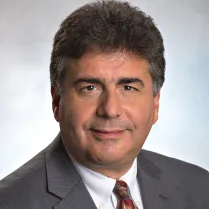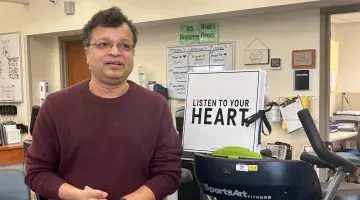Redesigning Vascular Care for South Shore Residents
Author

Edward Marcaccio, MD, Chief of Vascular Surgery
South Shore Hospital’s new Chief of Vascular Surgery Edward Marcaccio, MD, Brigham and Women's Surgical Associates, joined South Shore Health in September. Before assuming the role, he served as Chief of Vascular Surgery and Director of the Non-Invasive Vascular Laboratory at Rhode Island Hospital, the principal teaching hospital of The Warren Alpert Medical School of Brown University.
Dr. Marcaccio spent the last 22 years building an innovative vascular program at Rhode Island Hospital and is thrilled to be back in the Boston area where he trained as a surgical resident at Beth Israel Deaconess Medical Center.
We sat down with him recently to learn more about his plans to make South Shore Health the region’s leader in vascular care.
Why did you choose to come to South Shore Hospital—a community-based hospital—instead of another teaching hospital?
I have been lucky enough in my career to do everything I’ve wanted to do in academic medicine. In my previous role, I spent most of my time dealing with emergencies and life-threatening situations. Although I enjoy working to save lives in emergencies, I want to build preventive programs that have a real impact on the health of patients with vascular issues. It became clear to me when I interviewed for this job that the leadership team at South Shore Health has made improving the health of the community a top priority. That type of support for preventive health care was a big reason why I wanted to lead the vascular program here. In this role, I have the opportunity to not only perform surgery, but to also focus on creating programs to prevent emergency situations.
What types of preventive programs do you envision and why are these so important for vascular patients?
I’ve already started to work with South Shore Health's outpatient rehabilitation team to develop a vascular exercise program. Exercise combined with other risk factor modification has the potential to alter the progression of diseases like peripheral arterial disease (PAD) and decrease the occurrence of cardiovascular events. I’d also like to offer more community screenings for things like abdominal aortic aneurysm and PAD so we can recognize and treat vascular disease early. By the time patients are having symptoms, the disease is likely fairly advanced. It’s all about identifying who is at risk and working with them to make lifestyle changes earlier instead of starting with interventions to treat advanced disease.
How would you describe the quality of care we provide at South Shore Health for vascular patients?
I can confidently say that we can provide the same level of care to our vascular patients here that they would get in Boston—with very few exceptions. Our strong connection with Brigham and Women’s Hospital is an added benefit to patients because we can send extremely complex cases to Boston for treatment and can also enroll patients in clinical trials if appropriate. Getting care close to home is important for most people with any chronic disease, but this is especially vital for patients with vascular disease. Vascular patients tend to be older and less mobile and require a lot of follow-up care. You don’t want them to avoid getting the care they need because the drive is too long or they are stressed out about parking and walking long distances.
I have also been so impressed by the quality of clinical talent we have at South Shore Health—from the operating room (OR) team to our vascular surgeons and interventional cardiologists in the cardiac catheterization laboratory. Our clinical talent is exceptional, and I’m hoping to coordinate this care by creating multidisciplinary conferences to share ideas on the best treatment options for patients. I am a strong believer in the notion that there is no individual in medicine anymore. I want to be sure we’re using our shared knowledge to provide the best possible care for our vascular patients.
What does the future of South Shore Health’s vascular program look like?
In the short term, we are working on becoming an Accredited Vein Center and will look to treat more patients with varicose veins—an extremely common condition that affects half of Americans beyond 50 years old. Long-term goals include building an endovascular suite, a specialized room that allows vascular surgeons to perform advanced endovascular procedures that require both open surgical and image-guided techniques simultaneously. This would allow us to do more complex aneurysm repairs and peripheral vascular interventions at South Shore Hospital. In summary, my goal is to make South Shore Health the place that patients seek for complete management of their cardiovascular health.
Can you share an interesting fact about yourself with us?
More than 25 years ago, I trained with Gary Gibbons, MD, Medical Director of South Shore Health's Center for Wound Healing, at Beth Israel Deaconess Medical Center in Boston. He was a mentor to me in my early days, launching my career in vascular surgery, and another reason why coming to South Shore Health was an easy decision. Medicine also runs in my family. My wife is a physician and both of my children are also training to be physicians.
South Shore Health's Vascular program offers services to diagnose, treat and manage vascular disease.
Author

Edward Marcaccio, MD, Chief of Vascular Surgery






